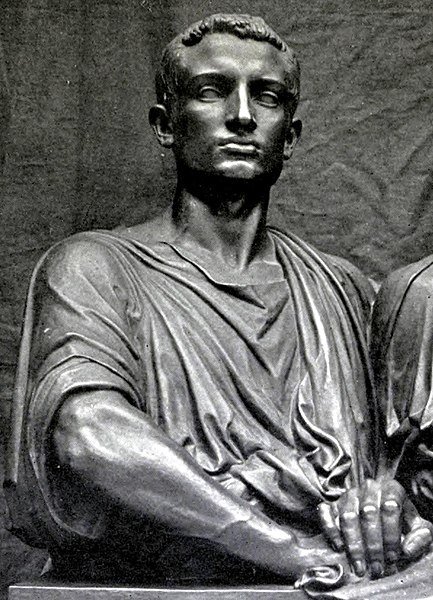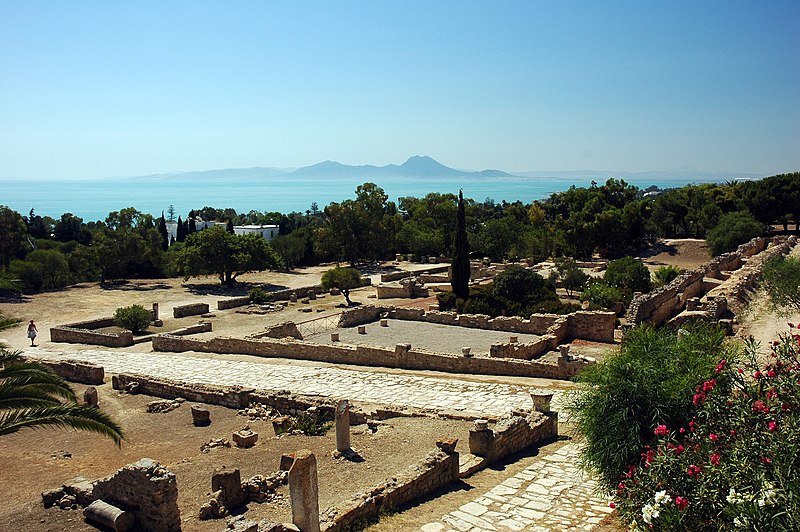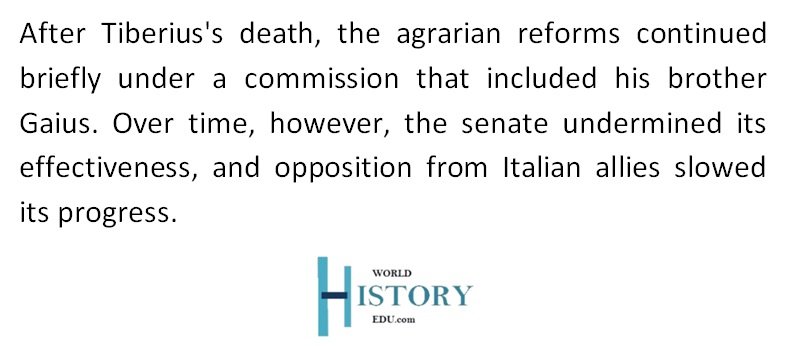
A 19th-century commemorative sculpture of the Gracchi brothers by Eugène Guillaume includes a bust of Tiberius.
Tiberius Sempronius Gracchus (c. 163–133 BC) was a Roman statesman renowned for his agrarian reforms. His efforts to redistribute land from the wealthy elite to the poorer citizens sparked significant political upheaval and ultimately led to his violent death. Tiberius’ actions and their consequences marked a pivotal moment in Roman history, often seen as the starting point of the Republic‘s decline.
Birth and Aristocratic Origins
Tiberius was born into a distinguished Roman family around 163 or 162 BC. His father, also named Tiberius, was a prominent statesman who served as consul twice and censor once. His mother, Cornelia, was the daughter of Scipio Africanus, a celebrated general who defeated Hannibal in the Second Punic War. Tiberius grew up under his mother’s guidance after his father’s death, receiving an exceptional education.
Family Alliances
Tiberius married Claudia, daughter of Appius Claudius Pulcher, a political figure opposed to the Scipios. This marriage likely aimed to reconcile the families, forming a strategic alliance. Through these connections, Tiberius was deeply embedded in Rome’s aristocratic and political elite.
Third Punic War
Tiberius began his military service as a legate under Scipio Aemilianus during the Third Punic War (149–146 BC). His actions in this campaign, particularly scaling Carthage’s walls, demonstrated his bravery and leadership.
How and Why did Carthage Fall? – The Destruction of Rome’s Fiercest Rival
Numantine War
As quaestor in 137 BC, Tiberius served under Gaius Hostilius Mancinus during the Numantine War in Spain. Following a disastrous Roman defeat, Tiberius negotiated a treaty to save the army, leveraging his family’s goodwill with the Numantines. However, the treaty was deemed humiliating by the Roman Senate, tarnishing Tiberius’ political reputation.
Tribunate and Agrarian Reform
Tiberius sought to address economic and social disparities in Rome. He blamed the decline in free Roman citizens on the concentration of land ownership by wealthy elites. This trend, combined with the displacement of small farmers, created economic instability and reduced military recruitment.
Gaius Gracchus expanded on his brother’s reforms with more extensive social, economic, and political proposals.
In 133 BC, as tribune of the plebs, Tiberius introduced the lex agraria, a law enforcing a long-ignored limit on the amount of public land individuals could hold. Excess land was to be redistributed to poor citizens. This aimed to:
- Revitalize the rural population.
- Increase military enlistment by providing landowners who met property qualifications.
- Address economic inequality and urban overcrowding.

The ruins of Carthage, located in modern-day Tunisia. Tiberius served as an officer under Scipio Aemilianus during the Third Punic War, when the city was razed.
Opposition from the Senate
Tiberius faced fierce resistance from the Senate, where many members were wealthy landowners. Marcus Octavius, a fellow tribune, vetoed the reform bill. Tiberius retaliated by seeking Octavius’ removal from office, an unprecedented move that deepened political divisions.

Breaking Political Norms
Tiberius bypassed traditional senatorial authority, pushing his reforms directly through the plebeian assembly. His actions—seen as populist and autocratic—provoked fears that he aimed to undermine the Republic’s institutions.
Death and Political Fallout
In 133 BC, Tiberius sought re-election as tribune, violating the norm against consecutive terms. His enemies accused him of aspiring to tyranny. During a riot led by Publius Cornelius Scipio Nasica, Tiberius and his supporters were attacked and killed. Their bodies were desecrated and thrown into the Tiber River.
Despite Tiberius’ death, the agrarian law remained in effect. The commission established to oversee land redistribution continued its work, allocating significant tracts of land to citizens. However, opposition and legal challenges gradually undermined its progress.

Legacy
Tiberius’ younger brother, Gaius Gracchus, continued his reformist agenda a decade later, proposing even more radical changes. Like his brother, Gaius met a violent end, cementing the Gracchi brothers as martyrs of social and political reform.
Tiberius’ tribunate exposed the fragility of the Roman Republic’s political system. His death marked the onset of a period characterized by:
- Increased political polarization.
- The normalization of violence in political disputes.
- Erosion of traditional republican norms.
Historians often view 133 BC as a turning point, marking the beginning of the Republic’s decline. Tiberius’ actions and the Senate’s violent response revealed deep-seated tensions that would later culminate in the Republic’s collapse.
Historical and Modern Perspectives
Contemporaries like Cicero blamed Tiberius for dividing Rome into factions. Others, including later writers, portrayed him as a champion of the common people.
Modern historians debate the motivations and effects of Tiberius’ reforms. While some view him as a visionary addressing systemic inequality, others argue he pursued personal political ambitions, destabilizing the Republic.
Tiberius’ life and death have inspired political movements throughout history. For instance, French revolutionary François-Noël Babeuf adopted the name “Gracchus” to symbolize his fight for social justice.
Frequently Asked Questions abpit Tiberius Gracchus
What were Tiberius Gracchus’ main reforms?
Tiberius Gracchus introduced agrarian reforms to redistribute public land (ager publicus) from wealthy landowners to poorer citizens. This was meant to alleviate economic inequality, bolster military recruitment, and reduce urban overpopulation.
Why was Tiberius’ agrarian reform controversial?
The reform threatened the interests of wealthy landowners who had been occupying public land for generations. It also bypassed traditional senatorial approval, relying instead on the people’s assembly, breaking political norms.
How did Tiberius respond to opposition?
When fellow tribune Marcus Octavius vetoed the agrarian bill, Tiberius took the unprecedented step of deposing him through a popular vote, further escalating political tensions.
What led to Tiberius’ downfall?
Tiberius’ push for re-election as tribune and his proposal to use the inheritance of King Attalus III to fund his reforms alarmed the senate. His actions were perceived as tyrannical, leading to fears of monarchical ambitions.
How did Tiberius Gracchus die?
Tiberius was killed during a riot instigated by his senatorial opponents, led by his cousin Publius Cornelius Scipio Nasica. He was beaten to death along with many of his supporters.
Why is Tiberius Gracchus considered a turning point in Roman history?
His death marked the beginning of political violence in the Roman Republic and a shift toward increased polarization and disregard for constitutional norms, eventually contributing to the Republic’s decline.
























